His mother died in 1190, giving birth to twins sons, and Louis inherited her dowry and the title of Count of Artois, which he held until his father died, and the title reverted to the crown when Louis became King of France in 1223.
After lengthy negotiations between his father, Phillip, King of France and John Lackland, King of England, and as a condition of the Treaty of Le Goulet between these two, Louis was married on 23 May 1200, at the age of 12, to Richard's sister's daughter, Blanche of Castile, also 12 at the time and born in Spain. Her grandmother, Eleanor of Aquitane, would cross the Pyrenees, bringing the girl from Spain to France. The marriage was finally consummated in 1205 and Blanche would bear the first of thirteen children.
When the English Barons rebelled against King John Lackland of England, they offered the throne to Louis, who was able to land at the Isle of Thanet with an army in May of 1216 and march to London with very little resistance. There, Louis was proclaimed king by his supporters, including King Alexander II of Scotland. Louis captured Winchester in June, but when King John died in October, the barons turned their favors to John's son, Henry III, even thought he was only nine years old. English forces led by William Marshall finally forced Louis to the Treaty of Lambeth in September of 1217, Louis promising not to attack England, agreeing that he really never was king, and Louis was given a compensation of 10,000 marks.
King Philip died on July 14, 1223, Louis was coronated August 6th at the cathedral at Reims. Louis would continue to battle his father's enemies, resulting in the capture of Avignon and Languedoc, yet he reversed his father's ruling of usury for Jews, creating havoc for both the church and the barons who were in disagreement as some were profiting from the lending. The conflicts would continue until Louis's death on November 8th, 1226 during his travels from the chateau at Montpensier, Puy-de-Dome Auvergne back to Paris. His son, Louis IX succeeded him on the throne.
The children of Louis and Blanche were:
Blanche 1205-1206
Agnes 1207-1207
Philip 1209-1218, betrothed to Agnes of Donzy
Alphonse, twin 1213-1213
John, twin 1213-1213
Louis 1214-1270, King of France
Robert Artois 1216-1250, killed in battle in Egypt
Philip 1218-1220
John Tristan 1219-1232, Count of Anjou and Maine
Alphonse 1220-1271 Count of Poitou and Avergne, Count of Toulouse thru marriage
Philip Dagobert 1222-1232
St Isabelle 1225-1269
Charles Stephen 1226-1285 Count of Anjou and Maine, Provence and King of Sicily
His mother died in 1190, giving birth to twins sons, and Louis inherited her dowry and the title of Count of Artois, which he held until his father died, and the title reverted to the crown when Louis became King of France in 1223.
After lengthy negotiations between his father, Phillip, King of France and John Lackland, King of England, and as a condition of the Treaty of Le Goulet between these two, Louis was married on 23 May 1200, at the age of 12, to Richard's sister's daughter, Blanche of Castile, also 12 at the time and born in Spain. Her grandmother, Eleanor of Aquitane, would cross the Pyrenees, bringing the girl from Spain to France. The marriage was finally consummated in 1205 and Blanche would bear the first of thirteen children.
When the English Barons rebelled against King John Lackland of England, they offered the throne to Louis, who was able to land at the Isle of Thanet with an army in May of 1216 and march to London with very little resistance. There, Louis was proclaimed king by his supporters, including King Alexander II of Scotland. Louis captured Winchester in June, but when King John died in October, the barons turned their favors to John's son, Henry III, even thought he was only nine years old. English forces led by William Marshall finally forced Louis to the Treaty of Lambeth in September of 1217, Louis promising not to attack England, agreeing that he really never was king, and Louis was given a compensation of 10,000 marks.
King Philip died on July 14, 1223, Louis was coronated August 6th at the cathedral at Reims. Louis would continue to battle his father's enemies, resulting in the capture of Avignon and Languedoc, yet he reversed his father's ruling of usury for Jews, creating havoc for both the church and the barons who were in disagreement as some were profiting from the lending. The conflicts would continue until Louis's death on November 8th, 1226 during his travels from the chateau at Montpensier, Puy-de-Dome Auvergne back to Paris. His son, Louis IX succeeded him on the throne.
The children of Louis and Blanche were:
Blanche 1205-1206
Agnes 1207-1207
Philip 1209-1218, betrothed to Agnes of Donzy
Alphonse, twin 1213-1213
John, twin 1213-1213
Louis 1214-1270, King of France
Robert Artois 1216-1250, killed in battle in Egypt
Philip 1218-1220
John Tristan 1219-1232, Count of Anjou and Maine
Alphonse 1220-1271 Count of Poitou and Avergne, Count of Toulouse thru marriage
Philip Dagobert 1222-1232
St Isabelle 1225-1269
Charles Stephen 1226-1285 Count of Anjou and Maine, Provence and King of Sicily
Family Members
-
![]()
Philippe de France
1209–1218
-
Princess Valois Of France
1211–1270
-
![]()
Louis IX of France
1214–1270
-
![]()
Louis IX of France
1214–1270
-
![]()
Robert I d'Artois
1216–1250
-
![]()
Alphonse III de Poitiers
1220–1271
-
![]()
Philippe Dagobert de France
1222–1232
-
![]()
Saint Isabelle of France
1225–1270
-
![]()
Charles of Anjou
1226–1285
-
![]()
Charles of Anjou
1226–1285
-
![]()
Charles I of Anjou
1226–1285

















